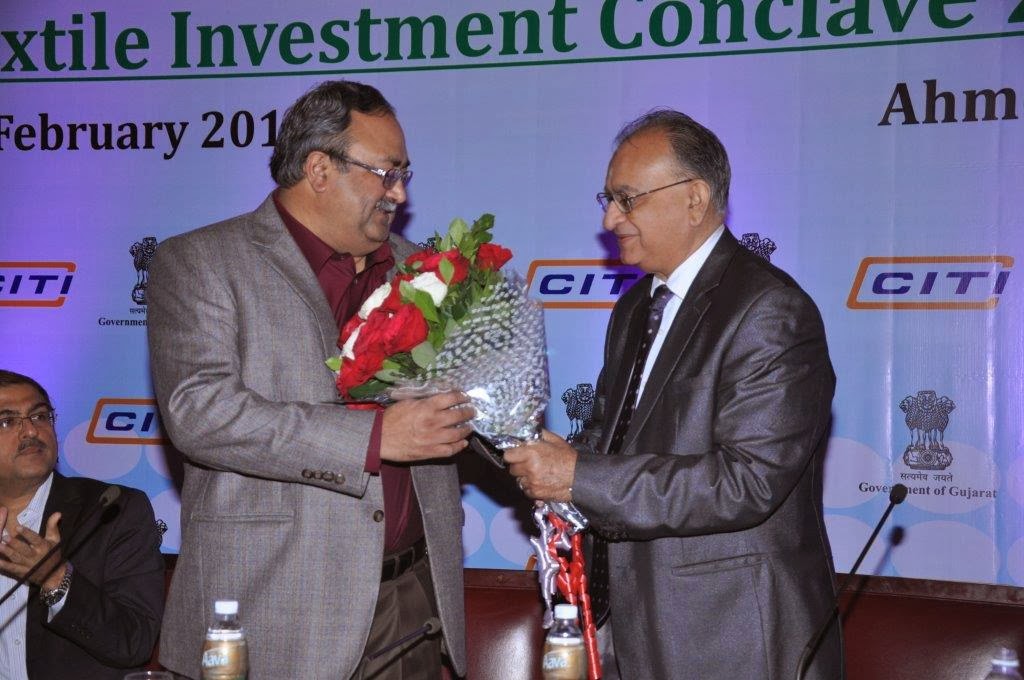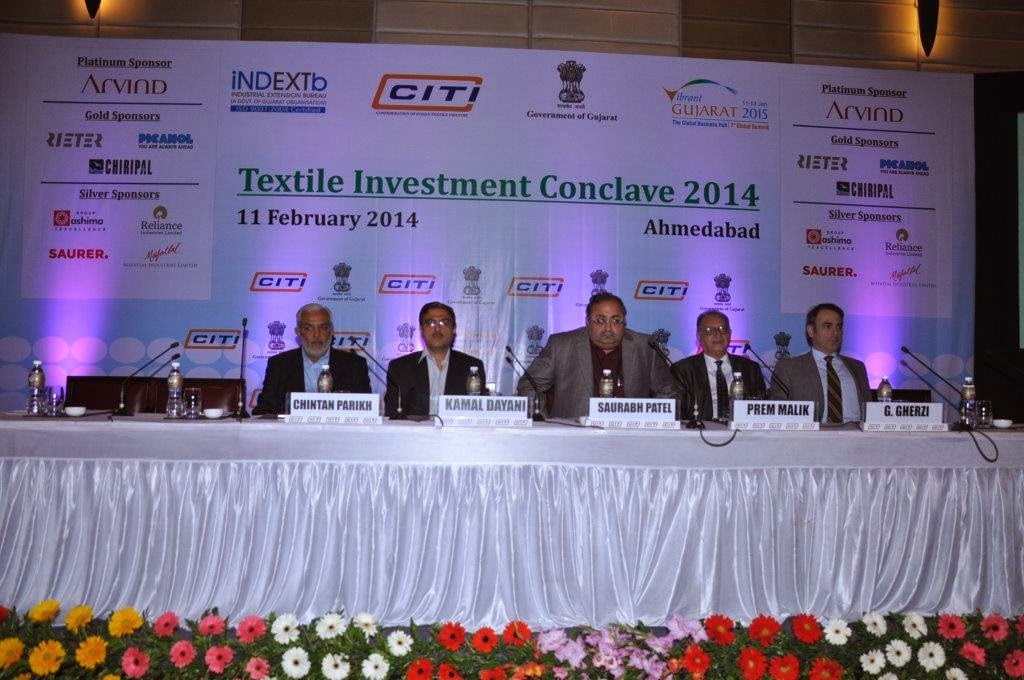 CITI orgainsed a 'Textile Investment Conclave' at Hotel Courtyard by Marriott at Ahmedabad, Gujarat on February 11, 2014. Experts deliberated on the textile industry in India and endorsed Gujarat as one of the most investment friendly destinations in the country. Gujarat was the partner state at the conclave. The one day event was inaugurated by Gujarat’s minister of state for industry Saurabh Patel.
CITI orgainsed a 'Textile Investment Conclave' at Hotel Courtyard by Marriott at Ahmedabad, Gujarat on February 11, 2014. Experts deliberated on the textile industry in India and endorsed Gujarat as one of the most investment friendly destinations in the country. Gujarat was the partner state at the conclave. The one day event was inaugurated by Gujarat’s minister of state for industry Saurabh Patel.
In his inaugural address, Patel said, “In Gujarat we believe in inclusive growth. The last 
decade has been good for us, especially where the manufacturing sector is concerned. Today, we are practically number one in the country. Out of the total GDP, 27 per cent is the share of the manufacturing sector and 25 per cent of exports are produced in Gujarat. We decided to increase our GDP share and focus on certain areas. Textiles is one of them. We came out with an aggressive textile policy. In five to seven years, Gujarat will be one of the biggest textile hubs in the country.”
Welcoming the delegates, Prem Malik, Chairman, CITI said that historically the textile and clothing industry has been one of the pivotal manufacturing segments of Gujarat. Both Gujarat and Mumbai were called the Manchester of India and there are 60 mills in Ahmedabad alone. “Even after extensive industrialization, textile and raw materials continued to be one of the largest and highly successful contributors to the economy of the state. Gujarat is the largest cotton producing state. It has a one-third share of the total crop production in the country. It is the largest manufacturer of manmade fiber and filament. Among the value added products Gujarat has a phenomenal position, be it cotton fabrics, denims, manmade fibers, garments, technical textiles, made-ups,” he said emphasizing the state’s strong position as an investment destination.
Gujarat in focus
Elaborating on sharpening the strength, Malik further said, “The fact remains that Gujarat needs a higher textile production for using its raw material strength in full. Gujarat cotton has been leading the textile industry all over the country and even other textile producing countries. Transportation costs need to be reduced.”
Gujarat’s textile policy, encourages industrialists to look seriously for fresh investment opportunities in the state. “The textile policy has created a multiplier effect on the textile economy of India. Several other states have come forward with their own textile policies with incentives and other options. But Gujarat has the first mover advantage and the most attractive package for the textile industry,” he added.
Reiterating a similar point, in his keynote address, Kamal Dayani, Industries Commissioner of Gujarat, said, “Gujarat is the largest cotton producer in the country. But we export a lot of cotton because we don’t have the capacity to absorb it. Why can’t we have value addition in cotton like yarn or fabric and export garment than raw cotton? With this aim in mind the government of Gujarat came out with a textile policy one and a half years back. It covered the entire value chain right from farm to fabric. Lots of investment intentions have been expressed. About ten textile and spinning parks have been approved in principle. Maybe in a year and a half we should see these investments taking off.”
He said the textile policy also encourages processing, garmenting, ginning. “We encourage investors to go through this policy in detail and make wise commercial investments. I hope Gujarat turns to be a major destination for investments in the textile sector. Technical textiles have huge applications. Infrastructure also uses technical textiles abroad though in India this hasn’t happened. Keeping this in mind we have a technical textile chapter in our policy. We want units located in Gujarat to capture at least 50 percent of the market for technical textiles.
The government of Gujarat has approved two centers of excellence. One is exclusively for technical textiles and that’s located in Surat. One is on composites. We expect the new textile policy to bring in Rs 30,000 crores of investment in the next four years to Gujarat,” he added.
Malik pointed out that this is the time to sharpen competitive edge in textile production through domestic and international investments and to optimize the trade benefits in global textile and clothing markets. “The total production of textiles in India is $100 billion. This year exports will cross $40 billion from 34 billion last year. We have abundant raw materials, a large work force, a long textile tradition and entrepreneurship. India has tremendous potential to achieve tremendous growth in production and export of textile products. We have a large youth population and growing disposable income. This section will demand lifestyle products. And the textile sector will be a major beneficiary,” he opined.
Lalbhai on Indian textiles and growth triggers
Sanjay Lalbhai, CMD of Arvind in his interaction with Arvind Singhal, Chairman, Technopak delved on the state of Indian textile industry as a whole. He emphasized on the need to go vertical and set-up large scale apparel manufacturing plants, if India wants to increase its share in the global market.
He said that world textile trade in 2003 was $430 billion (over Rs 25,00,000 crores) by 2012 it was $750 billion (over Rs 45,00,000 crores). It’s likely to be 1,150 billion dollars (over Rs 69,00,000 crores) by 2020. “In 2003 we were 3 per cent of the world trade, by 2012 we were four and a half per cent, and China was 17 per cent in 2003, now that’s 33 per cent. But we have not been able to think scale. We have not gone for verticalisation.”
He pointed out that India has not been able to get business away from China even though China has become more expensive than India. “We still depend on Bangladesh, Cambodia, Vietnam, Sri Lanka to convert our fabrics into garments. Major buyers in the US and Europe want to shift business from China to India but they don’t know where the conversion to the final garment will happen. Bangladesh is facing a compliance issue. So things are uncertain there. India should take up garmenting seriously and build scale,” he added.
Talking about emergence of brand India, he said, “Brand India will only emerge if we become customer centric. So if we want to boast and differentiate with the very value added products coming from Italy or any of the European destinations then we have to invest in product development and design.” He expressed his views on several issues like increasing domestic demand, strengths of Indian textile industry, building brand India, advent of IT and E-commerce and South Africa, as emerging destination among others.
Focus on building industry strengths
Interactive sessions on subjects like textile policy of Gujarat and its impact, global textile scenario and technical textiles were also held during the day. The first session discussed subjects like growth opportunity in cotton textiles in India and Gujarat, cotton and its complexities for the Indian industry, investment opportunities in VSF and comparative analysis of state level textile policies. Experts like V K Ladia, Chairman, Rajasthan Texchem, Rajesh R Mandawewala, Managing Director, Welspun India, Sanjay Jain, MD, TT, Ajay Sardana, Assistant VP, Global Customers & Market Intelligence, Birla Cellulose-Pulp & Fibre Business, Grasim, Vishal Chiripal, CEO, Chiripal Industries focused on the state’s business potential.
The second session for the day was about global textile scenario. Experts highlighted on subjects covering US textile industry, India-Korea partnership in textile industry, promising future of investments in weaving industry, business opportunities for textile machinery industry and textile industry in South Africa. among others. The third session on technical textiles saw experts like Pramod Khosla, Chairman, Indian Technical Textile Association, Anup Rakshit, Head – MTS and Product Development, Polyester Sector – PSF Business, Reliance Industries discussed scope of synthetics and technical textiles.












